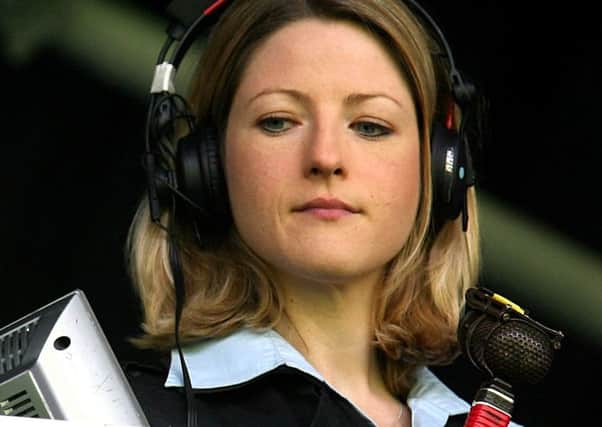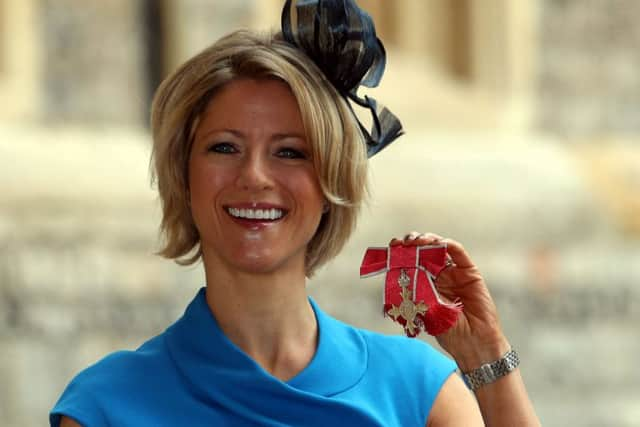Jacqui Oatley on her passion for football, getting an MBE and her first Match of the Day commentary


JACQUI Oatley was on her way to cover a darts tournament last November when her husband rang her from home to tell her that a letter had arrived from the Cabinet Office marked “urgent”.
Inside was a note informing here that she was being awarded an MBE for services to diversity in sport and broadcasting. “I was completely shocked and humbled and I still am,” she says. “You look at all the people who have achieved this honour, it never crossed my mind it would happen to me.”
Advertisement
Hide AdAdvertisement
Hide AdThe sports presenter, who received her medal from Princess Anne at Windsor Castle last week, admits she was initially a little apprehensive about getting the award. “I’m a journalist who writes about other people and my first thought was that people might think ‘what has she done to earn that?’ But actually the reaction has been great and I’ve had some really lovely letters.”


Oatley shot to prominence nine years ago when she became the first female commentator to appear on Match of the Day (which caused a bit of a rumpus at the time) and has gone on to become a household name having just returned from the European Championships in France where she was a key part of ITV’s presenting team.
Today, the 41-year-old broadcaster - along with the likes of Sue Barker, Clare Balding and Gabby Logan - has helped pave the way for a new generation of female sports reporters, commentators and pundits. But while the glass ceiling has been cracked it hasn’t yet been completely smashed, as she pointed out recently. “My real concern is the lack of female football sports writers. I have just come back from a month at the Euros, I went to 11 matches and I only came across one female print journalist in that time.”
Oatley’s journey as a broadcasting pioneer started in Wolverhampton where she grew up as a sports fanatic in a close-knit family, although she didn’t get into football until she was about 13. “I loved golf, tennis and hockey and then one day I sat and watched a football match on TV and it was as if something just clicked and I became completely obsessed.”
Advertisement
Hide AdAdvertisement
Hide AdShe went on to play at an amateur level but says it never crossed her mind that she could become a football writer. “I was never really encouraged to do it at school, not that I’m blaming anyone, because I never thought about it either. I just didn’t know anyone in the world of sport or journalism,” she says.


“That’s why whenever I speak to young people or give talks in schools I always impress on them the importance of not going for the easy option. You don’t have to accept the low-hanging fruits of a career your aren’t interested in.”
Oatley studied German language and literature at Leeds University and spent four years working for an intellectual property firm. But it wasn’t until she had to give up football after suffering a bad knee injury in her late 20s that she decided to switch careers.
“I thought ‘life’s too short’ and I started doing evening classes. I gave up my job and my flat and slept on the friends’ floors and did full-time work experience.”
Advertisement
Hide AdAdvertisement
Hide AdShe earned a place on a postgraduate broadcast journalism course at Sheffield Hallam University and cut her teeth as a Radio Leeds reporter. Her first commentary job came from the less than exotic surroundings of Wakefield-Emley, who were entertaining Worksop Town.
“Now I do quite a bit of prep. But on this occasion I didn’t have time and obviously there wasn’t much information on the internet,” she says. “The first choice match had been called off and I didn’t know the players names.
“They all seemed to be six foot tall with short dark hair, so trying to identify them was a nightmare. It’s easily the hardest commentary I’ve ever done. If it had been Man United versus Arsenal it would have been easy.”
Despite this inauspicious start she quickly proved her mettle and soon found herself working for Radio Five Live. Then in April 2007 she was thrust into the limelight when she made history on Match of the Day - becoming the first woman commentator in the programme’s history, when she took the microphone for the Premier League game between Fulham and Blackburn Rovers.
Advertisement
Hide AdAdvertisement
Hide AdOatley admits she was shocked by the level of attention and scrutiny in the run-up to the match. “It was difficult. I’m not going to sugar coat it. I just wanted to do my job and instead I found myself the centre of attention. I’d been doing radio for several years already but a lot of people didn’t seem to realise that,” she says.
“My phone didn’t stop ringing for three days beforehand with people wishing me good luck or reporters wanting to do interviews.”
She says the match itself was a surreal experience. “People wanted photos with me and I remember the referee Graham Poll gave me the thumbs up just before kick-off. The photographers, instead of having their cameras trained on the new Fulham manager Lawrie Sanchez, were all looking up at me in the gantry. It was all very strange.”
Needless to say the world didn’t fall off its axis. “My next match was at Anfield and no one batted an eyelid. It was just a case of getting through that first commentary.” Which she did with aplomb.
Advertisement
Hide AdAdvertisement
Hide AdNine years on and Oatley is a recognisable face and voice on TV and radio. But as a female football commentator in what is historically seen a very male-orientated domain she has had to grow a thick skin over the years in order to deflect criticism. Although these days she takes it with a pinch of salt.
“If a woman commentator makes a mistake it’s still seen by some football fans as a catastrophe. They start saying that women don’t understand the laws of the game or the offside rule and it just makes me laugh because they just assume that because you’re a woman you can’t possibly understand football.”
But Oatley believes that attitudes have changed even in the last few years. “There’s so much more acceptance of women working in football and sport in general now. When I started covering darts I thought I might get some stick from die-hard darts fans but it wasn’t the case and actually they’ve been really appreciative.”
She has also started seeing herself more as a role model to other women. “It wasn’t something I used to think about much and I didn’t think of it as breaking down barriers for women in sport. You try and do a good job as a professional and be the best you can. But I get a sense now that if I do a good job then that can help other women who want to get into this career.”
Advertisement
Hide AdAdvertisement
Hide AdAnd it’s a job that has lost none of its lustre for her. “At the Euros you’re there listening to the national anthem in packed stadiums and it’s an absolute privilege. There’s no sense of it just being another football match. I never take it for granted, not for a second.”
Jacqui Oatley - a sport’s report
Jacqui Oatley was born in 1975 in Wolverhampton.
As a youngster she enjoyed sport and after watching a game on TV became a football fanatic. She studied at the University of Leeds, graduating with a degree in German in 1996. She spent four years working for an intellectual property firm in London before returning to Yorkshire to study broadcast journalims at Sheffield Hallam University.
While studying she joined BBC Radio Leeds a sports reporter and in 2003 got a job with Radio 5 Live. In 2007 she made history by becoming the first female commentator on Match of the Day.
Oatley was awarded an MBE in the 2016 New Year Honours for services to broadcasting and diversity in sport.